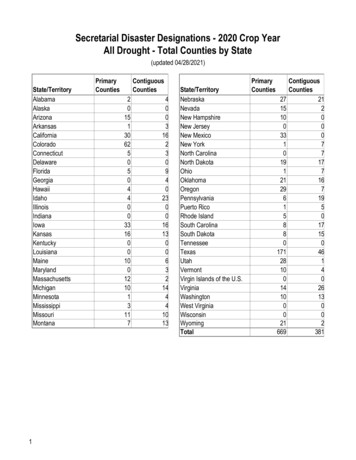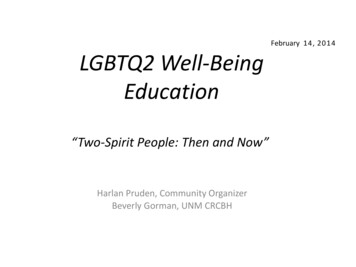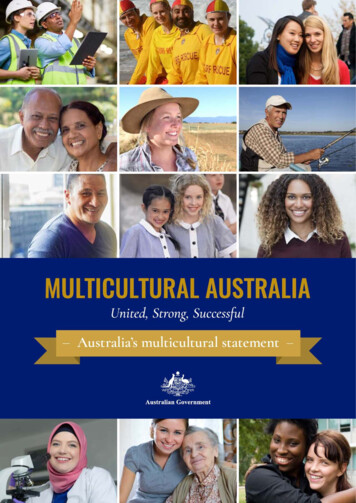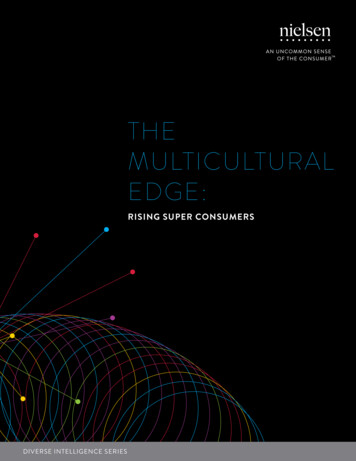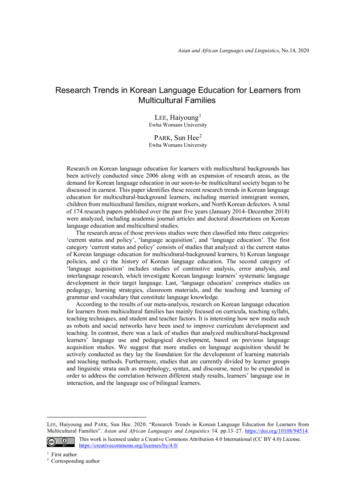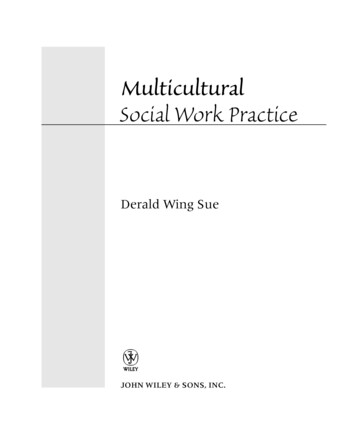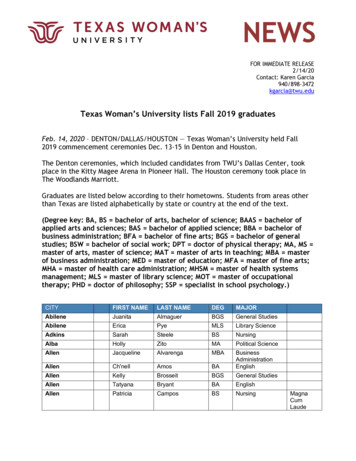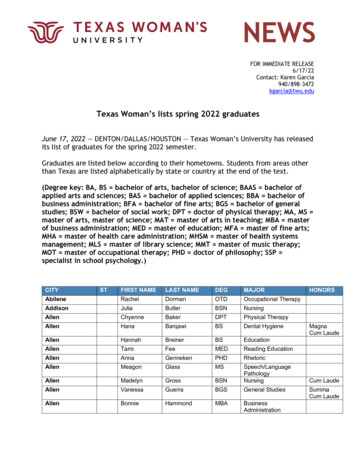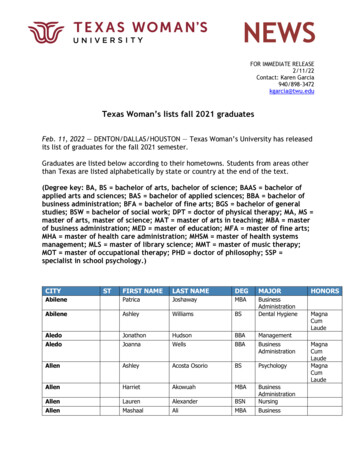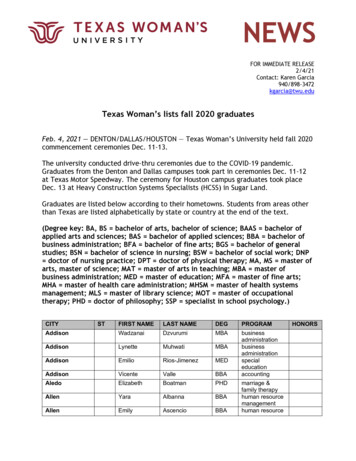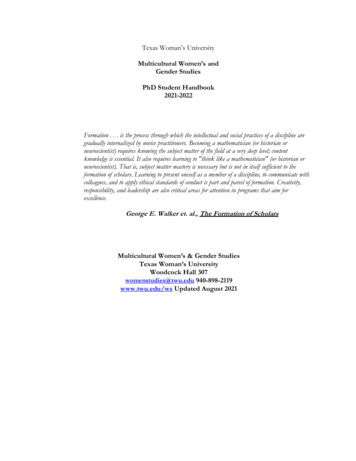
Transcription
Texas Woman’s UniversityMulticultural Women’s andGender StudiesPhD Student Handbook2021-2022Formation . . . is the process through which the intellectual and social practices of a discipline aregradually internalized by novice practitioners. Becoming a mathematician (or historian orneuroscientist) requires knowing the subject matter of the field at a very deep level; contentknowledge is essential. It also requires learning to "think like a mathematician" (or historian orneuroscientist). That is, subject matter mastery is necessary but is not in itself sufficient to theformation of scholars. Learning to present oneself as a member of a discipline, to communicate withcolleagues, and to apply ethical standards of conduct is part and parcel of formation. Creativity,responsibility, and leadership are also critical areas for attention in programs that aim forexcellence.George E. Walker et. al., The Formation of ScholarsMulticultural Women’s & Gender StudiesTexas Woman’s UniversityWoodcock Hall 307womenstudies@twu.edu 940-898-2119www.twu.edu/ws Updated August 2021
TABLE OF CONTENTSIntroduction . 1Texas Woman’s University . 1What is Multicultural WGS @ TWU? . 2Why “Multicultural”? . 2Doctoral Studies @ TWU . 2Educational Objectives . 3Faculty . 4The Ph.D. Degree Plan: An Overview . 5Ph.D. Coursework . 6Core Courses . 6Transdisciplinary Concentration . 6Research Methods Requirement (“Research Tools”). 7Curriculum Summary Chart . 8Qualifying Examination: Digital Portfolio . 9Submission Deadline. 10Electronic Portfolio Format . 10Evaluation . 12Admission to Candidacy . 12Dissertation. 13Chair and Graduate Committee . 14Prospectus and Oral Exam . 14Dissertation Hours . 14Final Examination and Formal Presentation . 15Final Semester Responsibilities and Deadlines . 15Professional Development . 16Annual Review . 16Mentoring . 17Intellectual Growth . 17Service . 17Self-Care . 17Recommended Timetable for Professional Academic Development . 17Year One . 17Year Two . 18Year Three. 18Year Four . 18
University Policies . 20Advisor . 20Grade Requirements . 20Course Load . 20Transfer Credits . 20Graduate Courses at the University of North Texas . 21Degree Plan . 21Student Rights & Responsibilities. 21Code Three (Reduced Tuition) . 218-Year Rule. 2199-Credit Hour Rule . 21Library Resources . 22Texas Woman’s University Woman’s Collection. 22University Libraries . 22Inter-Library Loan . 22Electronic Resources . 22Canvas . 22WMST-L (Multicultural Women’s & Gender Studies Listserv) . 22Financial Aid. 23University Scholarships. 23The American Association of University Women . 23National Multicultural Women’s & Gender Studies Association Awards and Scholarships .23Tuition and Fees. 23Graduate Assistantships . 23Academic Common Market . 23Grants and Loans . 24Professional Development Travel Assistance Funds. 24Student Services . 24The Office of Student Life . 24University Housing . 24Center for Student Development . 24TWU Counseling Center. 24Office of Diversity, Inclusion, & Outreach . 24Student Health Services. 24TWU Fitness and Recreation . 24Community Resources . 24Denton and Dallas/Fort Worth Metroplex. 24Apartment Complexes/Apartment Locators. 25Student Organizations . 25
Appendices. 261. Affiliated Multicultural WGS Faculty . 262. Core Course Descriptions . 273. Portfolio Rubric . 344. Dissertation Rubric . 355. Annual Progress Report . 376. Letters of Recommendation . 42References. 43
INTRODUCTIONWelcome to the doctoral program in Multicultural Women’s & Gender Studies (WGS) at TexasWoman’s University! As one of only a handful of doctoral programs in WGS and related fields inthe United States, we’re honored to have the opportunity to work with you to further thedevelopment of our academic field. We have compiled this handbook to assist you in progressingsuccessfully through the doctoral degree; it describes program requirements, areas of study, courseofferings, professional development, and MWGS policies; and it offers information about financialaid, graduate assistantships, and faculty members. This handbook does not cover every universityregulation governing graduate education at Texas Woman’s University and thus should be treated asa supplement to the TWU Graduate Catalog. In the case of discrepancies between the two, theGraduate Catalog should always take precedence.The Graduate Catalog is the final authority, and students are ultimately responsible for obtainingcorrect information. We encourage students to frequently check the Graduate School Web site(http://www.twu.edu/gradschool/), which contains helpful information as well as up-to-dateforms. In fall 2021 we implemented a new curriculum; students entering prior to this semestershould consult the 2020-21 handbook for details on the previous curriculum, if this is theirpreferred plan.This Multicultural WGS Doctoral Program Handbook is a work in progress! We welcome yoursuggestions as we work to create a useful handbook and a successful doctoral program. We also notethat various items might be revised in future years, as we all learn from our experiences.Texas Woman’s University: Texas Woman’s University (TWU) is the largest public universityprimarily for women in the United States and one of the most diverse institutions of highereducation in the nation. TWU has been a leader in the field of WGS since 1998, when the TexasHigher Education Coordinating Board granted approval for the University to offer the M.A. degreein Women’s Studies. This graduate program was the first degree program in the field established bya public institution in the State of Texas. We offer the only Ph.D. in Multicultural Women’s &Gender Studies in the South Central region of the United States. Texas Woman’s University has alongstanding commitment to Multicultural Women’s & Gender Studies, with many Texas firsts: thefirst freestanding Women’s Studies program, the first university to offer full-time faculty positionsspecifically in Women’s Studies, the first tenured faculty members in Women’s Studies, and the firstDepartment of Women’s Studies.The doctoral degree is designed to build on campus-wide expertise, including existing strengths atTWU in such fields as Dance, Nursing, Psychology, Rhetoric, Sociology, Government, HealthStudies, and Education. Existing library resources are extensive, reflecting TWU’s longstandingcommitment to women’s education and the University’s history as a leading educational institutionprimarily for women.1
What is Multicultural Women’s & Gender Studies @ TWU? We define the field ofwomen’s & gender studies (WGS) as a multicultural, multi-, inter-, and transdisciplinary fieldof study that promotes understanding of how gender is constructed and functions in social,cultural, historical, political, and institutional contexts. (We define “multicultural” broadly, toinclude ability, gender, nationality, ‘race’/ethnicity, region, religion, sexuality, and othersystems of difference.) Building on and expanding scholarship in a variety of academicdisciplines, the field of WGS pursues the following goals: To enhance understanding of the diversity of people’s lives particularly as they areimpacted by age, class, dis/ability, ethnicity, gender, nationality, race, religion,sexualityTo construct theories and methods for engagement in social, cultural, and intellectualcritique on behalf of social justice;To advance feminist/womanist scholarship by investigating and expanding existingmodes of knowledge and power;To analyze local and global systems of inequality while identifying strategies forsocial change; andTo develop leaders who can engage effectively with global communities,communicate with diverse audiences, build coalitions, and negotiate initiatives forsocial change.Why “Multicultural”? In December 2015, in order to underscore our commitment to nuanced,relational investigations of difference, we changed our name and degree programs from “Women’sStudies” to “Multicultural Women’s & Gender Studies.” We believe that this new name moreaccurately reflects the versions of WGS we practice and teach. We acknowledge that many radicaland progressive scholars have rejected the word “multicultural” because of the ways it has been coopted and used to support existing social conditions; rather than examine racism and other powerissues, commodified (corporate) multiculturalisms ignore systemic issues by offering facilecelebrations of diversity that encourage individuals simply to “tolerate” difference and thus do notchallenge the unjust status-quo. MWGS rejects these commodified multiculturalisms and definesmulticulturalism as a potentially radical tool for intellectual and social transformation. We believethat multiculturalism–when historicized and defined broadly to include dis/ability, economic status,ethnicity/race, gender, nationality, region, religion, sexuality, worldviews, and other systems ofdifference–offers unique opportunities to enact social change and produce new knowledge.Doctoral Studies @ TWU: The doctoral degree in Multicultural Women’s & Gender Studies at TexasWoman's University prepares students to revitalize contemporary life by creating new forms ofknowledge and praxis through transdisciplinary, transformative dialogues in diverse disciplines and fields.Doctoral degree recipients will be grounded in a rigorous graduate education and equipped with effectivecommunication and research skills, holistic-critical thinking skills, and transformative teachingtechniques. As part of the program’s unique transdisciplinary focus, students will obtain a deepunderstanding of scholarly production, research methodologies, and pedagogies in various disciplines inthe humanities and social sciences. They will use this knowledge to create new dialogues amongknowledge fields inside and outside the academy. Graduates will be prepared to serve as professors ofwomen's and gender studies and related disciplines and as leaders in nongovernmental, social service, andresearch agencies that address social justice issues.2
Doctoral Program Educational Objectives: The Ph.D. degree is forward-looking and aspires to assistin shaping WGS for the twenty-first century, while also contributing to the increased emphasis oninterdisciplinary studies in higher education. The hallmarks of the Ph.D. program in MulticulturalWomen’s & Gender Studies at TWU are: Transdisciplinarity (i.e., relational exploration, integration, and transformation of diversedisciplinary methodologies and theories) Multicultural-feminist scholarship Critical-holistic social theories Global perspectives on social inequalities Rigorous scholarship in the service of social changeThus, our educational objectives are to prepare graduates who:1. Demonstrate the ability to engage in critical-holistic analysis of well-defined problemsand theoretical issues related to the field of WGS;2. Demonstrate exemplary research skills and command of the scholarship in WGS,multicultural-feminist theories, and related fields;3. Transcend traditional academic boundaries by integrating diverse disciplinaryperspectives into their research and teaching;4. Produce innovative transdisciplinary scholarship that makes groundbreaking contributionsto society and to the fields of WGS, Multicultural Studies, and feminist/womanistscholarship;5. Assume leadership positions within Texas, the United States, and international academicsettings as well as in other policy-making, research, governmental, and non-governmentalorganizations that address women’s issues and social inequalities;6. Contribute to future developments in WGS and related academic fields by attaining andsucceeding in faculty positions;7. Develop innovative strategies to address the needs of diverse communities;8. Develop scholarship and produce publications in the service of social change; and9. Design and enact relational, innovative teaching strategies that address the needs ofdiverse learners.3
FACULTYFaculty members in Multicultural Women’s & Gender Studies at TWU are deeply committed toproviding students with individualized academic advising and mentoring. In addition to theMulticultural Women’s & Gender Studies core faculty, approximately thirty faculty from overfifteen departments throughout the university are formally affiliated with us. For a list of affiliatedfaculty, see Appendix 1.Faculty with Full-time Appointments in Multicultural Women’s & Gender StudiesDr. Agatha Beins, Associate Professor, Ph.D. in Women's and Gender Studies, Rutgers University.Office: WH 307L; Phone: 940.898.2117Research Interests: Histories of Feminism and Women’s and Gender Studies; Social MovementActivism; Print and Material Cultures; Underground Press and Zine Cultures; Cultural Studies; Artand Activism; Poetry and Poetic Forms; Feminist Pedagogies; Feminist/Womanist Theories andEpistemologies; and Food StudiesGraduate Courses: Foundations for Scholarly Inquiry in Women’s Studies; Feminist/WomanistTheories; Feminist Pedagogies; History of U.S. Feminisms; The Politics of Publication and Writing;The Cultures of Food and Foods of Culture; Art, Activism, and Social JusticeDr. AnaLouise Keating, Professor. Ph.D. in English, University of Illinois, Chicago. Office: WH307K; Phone: (940) 898-2129; Email: AKeating@twu.eduResearch Interests: Multicultural Womanist/Feminist Theorizing; Contemporary U.S. WomenWriters of Colors; Speculative Realism; Critical Race Feminisms; Queer Theories; GloriaAnzaldúa; Womanist Spiritual Activism; Transdisciplinarity; Transformation Studies; Indigenous& Womanist EpistemologiesGraduate Courses: New Directions in Feminist/Womanist Theories; Multicultural Women’s &Gender Studies Disciplinary/Interdisciplinary Knowledges; The Politics of Publications andWriting; U.S. Women of Colors; Feminist/Womanist Epistemologies; Feminist/WomanistTheories; Transgressive Identities: Queer Theories and Critical ‘Race’ Theories; Spiritual Activism;and Gloria Anzaldúa: Politics, Poetics, and ProseDr. Danielle Taylor Phillips-Cunningham, Associate Professor and Program Director, Ph.D. inWomen's and Gender Studies, Rutgers University. Office: WH 307F; Phone: (940) 898-2746; Email:DPhillips3@twu.eduResearch Interests: Critical Race Feminisms; Globalization and Transnationalism; Nineteenth andTwentieth-Century U.S. Women’s History; U.S. Labor and Migration History; Diversity Issues inHigher Education; Black Feminist ThoughtGraduate Courses: U.S. Women of Colors; Contemporary Feminist Theories; Black FeministThought; Transnational Feminisms; Women at Work: Race, Migrations, and Labors4
THE PH.D. DEGREE PLAN: AN OVERVIEWThe doctoral degree in Multicultural Women’s & Gender Studies is a flexible, highly individualizeddegree consisting of core courses and a variety of guided elective options. The specific degree planfor each student will vary, depending upon their background training, transdisciplinaryconcentration, research tools, dissertation topic, and career goals. While each student’s degree planwill vary, all students will share several milestones: Coursework Qualifying Examination (Portfolio) Dissertation Prospectus Dissertation Research and Writing Final Oral Presentation & ExaminationAlthough these features are the typical components of many doctoral programs, we have worked toshape them in ways designed to successfully facilitate your growth as a scholar, practitioner, andinnovator in the transdisciplinary field of Multicultural Women’s & Gender Studies. We hope thatthese milestones will assist you in developing the knowledge, creativity, and other skills you willneed to succeed in this field. We feel privileged to be one of only a very few doctoral programs inWomen’s & Gender Studies or related fields in the United States, and we aspire to create a forwardlooking doctoral degree.5
PH.D. COURSEWORKThe curriculum for the Ph.D. consists of a minimum of 72 graduate semester credit hours beyond thebaccalaureate degree. Students entering from the baccalaureate degree can earn a master’s degree alongthe way. Students entering with a master's degree can transfer in up to 30 hours (with MWGS approval).The proposed degree consists of core courses (18 hours), dissertation (12 hours), WS electives (12hours), and a Transdisciplinary Concentration (30 hours). 18 credit hours of core courses (nine three-credit-hour seminars in Multicultural Women’s &Gender Studies) 12 credit hours of MWGS electives 30 credit hours of a Transdisciplinary Concentration 12 credit hours for the dissertationCore Courses: The following courses are required of all students:WS 5023 Foundations for Scholarly Inquiry in Women's & Gender StudiesWS 5463 U.S. Women of ColorsWS 5843 Feminist/Womanist TheoriesWS 6103 New Directions in Feminist/Womanist Theories(Topic will vary and may be repeated for credit)WS 6303, Transdisciplinary Feminist Research MethodsWS 6403, The Politics of Publications and WritingWS 6983, Dissertation (6 credit hours)WS 6993, Dissertation (6 credit hours)Transdisciplinary Concentration:This concentration is designed to enhance the transdisciplinary nature of our doctoral degree, and toassist students in developing additional sets of innovative knowledges and skills that will strengthen theirresearch and professional experience. The transdisciplinary concentration will vary, depending uponwhether students enter with a bachelor’s degree or a master’s degree: Students entering with a master’s degree can transfer in up to 30 hours from their degree, with graduatefaculty approval. These 30 hours fulfill their Transdisciplinary Concentration. Students entering with a bachelor’s degree will have the opportunity to take additional courses inMWGS and other related fields that constellate into one of these recommended concentrations:Multicultural Studies, English/Rhetoric, Educational Leadership, Sociology, Nonprofit Work.(Students can also propose an alternative concentration, which must be approved by the graduatefaculty.) The specific courses selected should complement or enhance knowledge in the student’santicipated area of research for the dissertation.1 Throughout this document, “Multicultural Women’s & Gender Studies Graduate Faculty” canbe defined as the Multicultural Women’s & Gender Studies core faculty.6
Research Methods Requirement (“Research Tools”): The doctoral degree is granted inrecognition of the ability to undertake independent and original research. Therefore, in addition tothe other requirements for the degree, doctoral students are required to demonstrate competence inscholarly inquiry and the use of research methods related to their research interests in MulticulturalWomen’s & Gender Studies. At TWU, these research methods courses are known as “ResearchTools;” each “research tool” consists of six credit hours of coursework, and all TWU doctoralstudents are required to complete two research tools. One of the two research tools, TransdisciplinaryResearch Methods in WGS, is included in the required core courses: Transdisciplinary FeministResearch Methods (WS 6303) and The Politics of Publications and Writing (WS 6403). The secondresearch tool will vary, depending upon each student’s research and professional goals. Students willdevelop competence in another research concentration by selecting one of the following researchoptions in consultation with the graduate faculty and to complement their areas of specialization(including their dissertation topic). Here are some possible options:They will select courses from the remaining options for the second tool. Research Methods (qualitative and/or quantitative) Information Retrieval Pedagogy Foreign Language American Sign Language Rhetorical Criticism & Discourse AnalysisMany courses in other departments (at TWU and at UNT) can count for this research tool; work withyour advisor to select courses that best meet your needs.7
Curriculum SummaryRequired Core Courses (18 hours)WS 5023Foundations for Scholarly Inquiry in Women's & Gender StudiesWS 5463U.S. Women of ColorsWS 5843Feminist/Womanist TheoriesWS 6103New Directions in Feminist/Womanist Theories(Topic varies and may be repeated for credit)WS 6303Transdisciplinary Feminist Research MethodsWS 6403The Politics of Publications and WritingRequired Dissertation Hours (12 Hours)WS 6983Dissertation (6 credit hours)WS 6993Dissertation (6 credit hours)MWGS Electives (12 hours, s
Doctoral Program Educational Objectives: The Ph.D. degree is forward-looking and aspires to assist in shaping WGS for the twenty-first century, while also contributing to the increased emphasis on interdisciplinary studies in higher education. The hallmarks of the Ph.D. program in Multicultural Women's & Gender Studies at TWU are:
